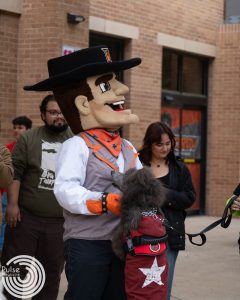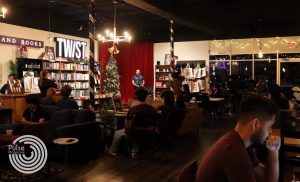Inside the 2024 Food Summit
The 2024 Food Summit Event is taking place from Wednesday to Saturday April 27 in McAllen at the Casa de Palmas Hotel. It marked the meeting of farmers and educators seeking a better food system.
The day starts off like any other. Shakera Raygoza, organic farmer and director of Terra Preta Farm and the Sentli Center, helps her kids get ready for school. Raygoza, formerly a registered nurse, and her husband began Terra Preta Farm in 2008. The farm eventually grew to 20 acres in Edinburg. After the drop-off routine is done, she comes home to the farm. After checking the schedule and the quality of the products, Raygoza makes sure everything will be delivered on time. Raygoza spends the remainder of the day inside working for the National Young Farmers Coalition and for her own organization, Sentli.
She said the idea for the Sentli Center came to fruition after she saw the impact of a disrupted food system during the COVID-19 pandemic, when people panicked and grocery store shelves were emptied month after month. The food shortage inspired Raygoza to collaborate with local farmers to create grocery boxes which they were then able to deliver. Raygoza said Sentli aims to connect people to farmers, get people out on the farm and help local farmers grow better so that there is a strong supply of local food. The program strives to educate, strengthen community ties and establish a direct line from farm to table.
“Hopefully, we get a strong local farming community, where the food stays here and we can make an impact where we are,” Raygoza said.
Raygoza will speak at the Texas Hispanic Farmer and Rancher Conference and the Food Summit. At the THFRC, she will present on the ways farmers can connect with schools to sell their produce.
“It’s a big opportunity because there’s lots of kids that need to eat and we want to make sure they’re eating healthy,” Raygoza said. “But most of the food that they purchase isn’t directly from a farmer. We can help small farms meet the eligibility requirements to sell, then, it’ll be a good source of income to reinvest also back into the community.”
She said connecting farmers with the community can help with health issues exacerbated by lack of access to fresh food.
“We have a lot of health issues here in the [Rio Grande] Valley, like high rates of diabetes, obesity, heart disease, and many of those diseases are related to what we eat,” Raygoza said. “So, it’s important that we have access to healthy options. Some people might not have a grocery store to go and buy [from]. What’s close is something that is high in calories but low in nutritional value. So, it’s very important that we have the farms close by or at least have some type of means of getting it from farmers to people, so that they do have the option to choose how they want to eat and make the best choice for themselves.”
In 2022, Raygoza shared her family’s farming journey with the U.S.House of Representatives Committee on Agriculture. She asked Congress to expand programs to make sustainable farming more accessible to young black, indigenous and other people of color.
“It was very intimidating at first to prepare and speak to that large of a group,” she said. “But, at the same time, it was very empowering to know that I could have an impact on the system and how it’s set up right now. Hopefully, [I become] an influencer for change to help improve some of the programs that are set up right now to help farmers make them more accessible and to ensure there’s funding for future help.”
Blanca Estella Delgado, cooperative developer for the UTRGV’ Center for Sustainable Agriculture and Rural Advancement, said access remains an issue for farmers and entrepreneurs alike. At SARA, the goal is to help educate and assist disadvantaged groups, she said. Delgado works within the Texas Rural Cooperative Center, which educates farmers, ranchers and entrepreneurs to help them band together to form a unit that works together to solve issues.
She also collaborates with Mujeres Esperanza, a group organized to help women in need, to provide support and resources to latina entrepreneurs that have been largely inaccessible in their community, the colonias, low-income areas around the Valley. Delgado helps them establish business plans and research to find out what they need to succeed. Delgado said one of the largest challenges the program faces is people trying to help feel their resources are inaccessible because of social preconceptions.
“[People] do have a lot of challenges,” she said. “… They feel that they are not educated, that they don’t belong in these spaces, that they are not going to be accepted. … And, so, you’re talking about building that trust, helping them to feel welcomed in spaces that, to be honest, they were not supposed to be in because of past traumas, you know, racism and stuff like that, classism, … ‘Why aren’t the people going?’ It’s because they’re still healing from that past.”
Although the women face many challenges, they have a wealth of hands-on knowledge, Delgado said, she meets them where they are at, rather than teaching right off of the page. She takes their experiences and helps them make the connection to further their knowledge and help them establish their businesses.
Delgado will also be at the THFRC discussing her work with a group of ranchers who have to drive over 200 miles to get their cattle processed, because there are no USDA-certified slaughterhouses in the Valley. These ranchers formed the RGV Livestock Meat Co-Op to work out the logistics and solve their problems together. This practice is sustainable, Delgado said; it ensures that these ranchers have a future.
Mackenzie Feldman, a UTRGV School of Earth, Environmental and Marine Sciences graduate student and co-founder of Re:wild Your Campus, a non-profit organization that fights to rid college campuses of harmful pesticides and herbicides, will host the youth panel at the 2024 Food Summit.
Feldman said the purpose of the Food Summit is connection.
“That was a thing to really bring farmers and connect them with community members who care about food systems,” she said. “[They] get to learn from each other and realize … whether you’re a student, you’re a farmer, you’re a community member, everyone eats.”
Sofia Martinez, an environmental science junior and vice president of the Environmental Awareness Club, is one of the original students that helped found the Hub of Prosperity. She said her family was skeptical about her working on a farm.
“My family normally said, ‘You better go to school. You better do this because you never know,’” Martinez said. “I have other family members who decided to move to the United States. They are agriculture workers and there’s always that idea of not [becoming] an agriculture worker like it hurts your back [because] you’re always in the sun. … It’s just so funny because now I’m in environmental science and there was a group of people and we started a farm and now it’s going by itself. Now, it’s a sustainable farm with no pesticides and it pays [my] bills.”
Apolonio Flores, an environmental science sophomore and a Hub of Prosperity student assistant, said his family worked in agriculture doing underpaid labor and they knew that was not something they wanted Flores to experience. He said the Hub of Prosperity is an organic, pesticide-free farm, a very different experience from his parents’.
“When I told them I was working at a farm, they obviously had the wrong idea or they didn’t want me to be exposed to these things because I did grow up with awareness against pesticides, but I just didn’t know the extent of how integrated it was into our community,” Flores said. “It doesn’t take much explaining to get people to sign the petition because they already know. They’re aware. They’ve seen it. These are super prevalent [issues] in the Valley and they usually affect migrants because my family did migrate from Mexico like many of our peers’ have. But I think that I explained to them and explained to people that the work we do at The Hub and at the garden on campus is a lot different. It is community engagement.”
He also said that, when the community comes out to The Hub, it is another way to ensure the success of our food system. It is also a process that can be healing, for many.
“I think that we are rebuilding a lot of people’s relationships to agriculture, especially younger people,” Flores said. “There is an interest to get out and do manual labor and do gardening because it’s a beautiful thing and it doesn’t have to be clogged by these preconceived notions by all these bad experiences. I’m not discrediting them, but, you know, it can be something beautiful and it can be something that doesn’t have to be such a heavy subject matter, or bring back such bad memories.”
The Texas Hispanic Ranchers and Farmers Conference and the Food Summit is ongoing and will continue until Saturday April 27 in McAllen Texas at Casa de Palmas Hotel.





